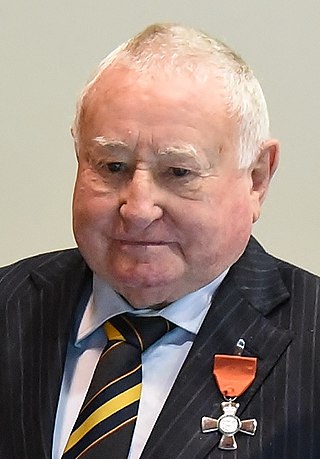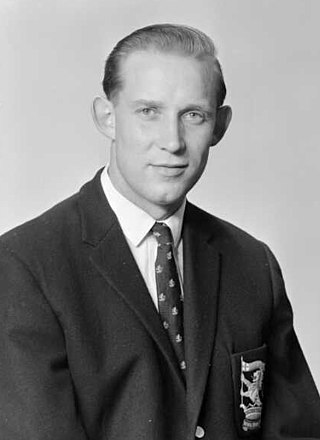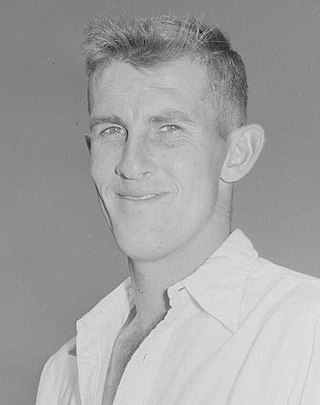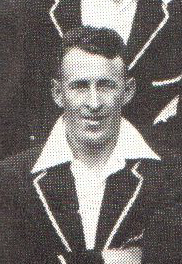
Bert Sutcliffe was a New Zealand Test cricketer. Sutcliffe was a successful left-hand batsman. His batting achievements on tour in England in 1949,which included four fifties and a century in the Tests,earned him the accolade of being one of Wisden's Five Cricketers of the Year. He captained New Zealand in four Tests in the early 1950s,losing three of them and drawing the other. None of Sutcliffe's 42 Tests resulted in a New Zealand victory. In 1949 Sutcliffe was named the inaugural New Zealand Sportsman of the Year,and in 2000 was named as New Zealand champion sportsperson of the decade for the 1940s.

Murray Ernest Chapple was a New Zealand cricketer. He played 14 Test matches over 13 years,scoring three fifties with a highest score of 76. He captained New Zealand in one Test in 1966.

Barry Whitley Sinclair was a New Zealand cricketer. He played 21 Test matches for New Zealand national team as a specialist batsman from 1962–63 to 1967–68,and captained the team from 1966 to 1968.
Graham Thorne Dowling is a former cricketer who played 39 Test matches for New Zealand and captained the national team in 19 of those matches. He led New Zealand to its first victory in a Test series,against Pakistan in November 1969. He was a specialist right-handed batsman who usually opened the innings.

Richard Charles Motz was a New Zealand cricketer. A right-arm fast bowler and hard-hitting lower order batsman,Motz played 32 Test matches for the New Zealand national cricket team between 1961 and 1969. He was the first bowler for New Zealand to take 100 wickets in Test cricket.

Noel Sherwin Harford was a New Zealand cricketer who played eight Test matches in the 1950s. In domestic cricket he played for Central Districts from 1953 to 1959 and for Auckland from 1963 to 1967.

Bruce Alexander Grenfell Murray was a Test cricketer for New Zealand who played 13 Tests as a right-handed opening batsman between 1968 and 1971. He was a school principal in the Wellington area from 1981 to 2002,and the author of several geography textbooks. After retiring from teaching,he was a cricket administrator in Wellington and a historian.
Terrence Wayne Jarvis is a New Zealand businessman and former cricketer who played 13 Test matches for New Zealand between 1965 and 1973. With Glenn Turner,Jarvis holds the opening Test partnership record for New Zealand of 387,scored against the West Indies in Georgetown,Guyana,during the 1971–72 season.

John Chaloner Alabaster was a New Zealand cricketer who played 21 Test matches for the country's national team between 1955 and 1972. A leg-spin bowler,he was the only New Zealander to play in each of the country's first four Test victories. In domestic cricket,he was often partnered at the crease for his provincial side Otago by his younger brother Gren,who bowled off-spin. A schoolteacher,he later served as Rector of Southland Boys' High School in Invercargill.

Robert Smith Cunis played 20 Test matches for New Zealand as a pace bowler between 1964 and 1972,and was later coach of the New Zealand national team from 1987 to 1990. His son Stephen played cricket for Canterbury between 1998 and 2006.

Matt Beresford Poore was a New Zealand cricketer who played 14 Test matches for New Zealand in the 1950s. He was born in Christchurch.
Bryan William Yuile is a former cricketer who played 17 Test matches for New Zealand in the 1960s. He played first-class cricket from 1959 to 1972,until his religious objection to playing on Sundays led to the end of his career.
Shafqat Rana is a Pakistani former cricketer who played in five Tests from 1964 to 1969.

Herbert Mendelson McGirr was a New Zealand cricketer who played in two Test matches in 1930. He was born at Wellington in 1891.

Graham Ellery Vivian is a former New Zealand cricketer who played in five Test matches and one One Day International (ODI) from 1965 to 1972. He made his Test match debut without previously playing in a first-class match. His father,Giff Vivian,played seven Tests for New Zealand in the 1930s. Both father and son were selected in New Zealand touring teams,in 1930 and 1965 respectively,at the age of 18.
Roy Ivan Harford is a former New Zealand cricketer who played in three Test matches against India during the 1967–68 season. He played first-class cricket in New Zealand from the 1965–66 season to the 1967–68 season.

Brian Frederick Hastings was a New Zealand cricketer. A middle-order batsman,he played 31 Test matches between 1969 and 1976,scoring four centuries. He played first-class cricket for Wellington,Central Districts and Canterbury between 1958 and 1977.

Michael John Froud Shrimpton was a New Zealand cricketer and coach.
The Pakistan national cricket team toured New Zealand from December 1964 to February 1965 and played a three-match Test series against the New Zealand team. All three Tests were drawn.
The New Zealand cricket team toured Australia in the 1967-68 season. They played four first-class matches and three other matches between 17 November and 12 December 1967. It was New Zealand's first dedicated tour to Australia since 1925-26. However,no Test matches were played.













